28 may 2019
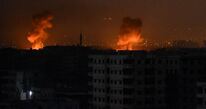
The Israeli army on Monday evening launched an aerial attack on Quneitra province, south of Syria, according to the Syrian Arab News Agency (SANA).
SANA reported, quoting a military source, that an Israeli missile targeted Tel al-Shaar in Quneitra, adding that a military vehicle was targeted, a Syrian soldier was killed, and two others were injured.
The Israeli army announced that it had bombed a target in Syria from which an attack on an Israeli aircraft was launched. The missile did not strike the plane and landed in Syrian territory.
Quneitra province is adjacent to the Golan Heights, of which two thirds are occupied and annexed by Israel.
SANA reported, quoting a military source, that an Israeli missile targeted Tel al-Shaar in Quneitra, adding that a military vehicle was targeted, a Syrian soldier was killed, and two others were injured.
The Israeli army announced that it had bombed a target in Syria from which an attack on an Israeli aircraft was launched. The missile did not strike the plane and landed in Syrian territory.
Quneitra province is adjacent to the Golan Heights, of which two thirds are occupied and annexed by Israel.
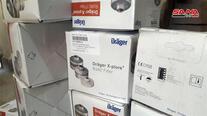
This picture, provided by Syria’s official news agency SANA, shows medical equipment recovered from a field hospital belonging to the so-called civil defense group White Helmets, which Syrian government forces discovered in the town of Qal'at al-Madiq, western Syria, on May 27, 2019
Syrian army soldiers have uncovered a considerable amount of medical supplies, some of them German-made, in a field hospital belonging to members of the so-called civil defense group White Helmets in the country’s western-central province of Hama.
Local sources, speaking on condition of anonymity, told Syria’s official news agency SANA that army soldiers made the discovery in the town of Qal'at al-Madiq on Monday as they were combing the area for hidden ordinance and improvised explosive devices, which Takfiri militants had planted there.
The report added that medical equipment, gas masks and their filters, chemical protective clothing and equipment, automated external defibrillators as well as surgical instruments, some of which were made in Germany, were recovered from the field hospital of the Western-backed group, which has been repeatedly accused of cooperating with Takfiri terrorists and staging false-flag gas attacks.
Syrian army soldiers have uncovered a considerable amount of medical supplies, some of them German-made, in a field hospital belonging to members of the so-called civil defense group White Helmets in the country’s western-central province of Hama.
Local sources, speaking on condition of anonymity, told Syria’s official news agency SANA that army soldiers made the discovery in the town of Qal'at al-Madiq on Monday as they were combing the area for hidden ordinance and improvised explosive devices, which Takfiri militants had planted there.
The report added that medical equipment, gas masks and their filters, chemical protective clothing and equipment, automated external defibrillators as well as surgical instruments, some of which were made in Germany, were recovered from the field hospital of the Western-backed group, which has been repeatedly accused of cooperating with Takfiri terrorists and staging false-flag gas attacks.
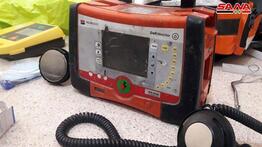
This picture, provided by Syria’s official news agency SANA, shows medical equipment recovered from a field hospital belonging to the so-called civil defense group White Helmets, which Syrian government forces discovered in the town of Qal'at al-Madiq, western Syria, on May 27, 2019.
Back in September 2018, Syrian government forces also found a large amount of Israeli-made medicine and medical supplies in a field hospital belonging to foreign-sponsored Takfiri militants in the country’s strategic southwestern province of Quneitra.
SANA then reported that army soldiers made the discovery in the village of Bariqa.
The report added that the hospital had modern CT scan, X-ray medical imaging machines, laboratory equipment and a pharmacy containing various types of antibiotics, vaccines and painkillers.
A brand-new and modern British ambulance in addition to a number of cars was also parked in the hospital courtyard, which militants apparently used to transfer their injured fellows to the site.
Separately on Monday, Syrian government forces also discovered a long tunnel once used by Takfiri terrorists during a clean-up operation in Qal'at al-Madiq town.
The 20-meter deep and 50-meter long tunnel incorporated a detention facility with several rooms, where extremists apparently used to hold civilians and torment them. Command centers for high-ranking militants were found inside the tunnel as well.
Syrian government forces managed to recover various kinds of munitions in addition to improvised cannon from the site.
Syria has been gripped by foreign-backed militancy since March 2011. The Syrian government says the Israeli regime and its Western and regional allies are aiding Takfiri terrorist groups that are wreaking havoc in the country.
Back in September 2018, Syrian government forces also found a large amount of Israeli-made medicine and medical supplies in a field hospital belonging to foreign-sponsored Takfiri militants in the country’s strategic southwestern province of Quneitra.
SANA then reported that army soldiers made the discovery in the village of Bariqa.
The report added that the hospital had modern CT scan, X-ray medical imaging machines, laboratory equipment and a pharmacy containing various types of antibiotics, vaccines and painkillers.
A brand-new and modern British ambulance in addition to a number of cars was also parked in the hospital courtyard, which militants apparently used to transfer their injured fellows to the site.
Separately on Monday, Syrian government forces also discovered a long tunnel once used by Takfiri terrorists during a clean-up operation in Qal'at al-Madiq town.
The 20-meter deep and 50-meter long tunnel incorporated a detention facility with several rooms, where extremists apparently used to hold civilians and torment them. Command centers for high-ranking militants were found inside the tunnel as well.
Syrian government forces managed to recover various kinds of munitions in addition to improvised cannon from the site.
Syria has been gripped by foreign-backed militancy since March 2011. The Syrian government says the Israeli regime and its Western and regional allies are aiding Takfiri terrorist groups that are wreaking havoc in the country.
18 may 2019
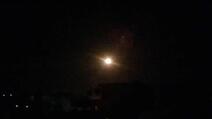
Explosions in the skies over Damascus
State television quotes military source as saying that air defenses detected objects coming from direction of 'occupied territory' and brought down several; monitoring group says at least five blasts heard in capital
Several explosions were heard in the Syrian capital Damascus on Friday night as the country's air defenses opened fire on "objects" coming from the direction of the Israeli Golan Heights, state media reported.
State news agency SANA quoted an unnamed military official as saying that Syrian air defenses discovered "hostile targets" coming from the direction of the Quenitra region on the edge of the Israeli Golan Heights.
The news agency said Syrian air defenses shot down several "objects."
The Britain-based Syrian Observatory for Human Rights, an opposition war monitor, reported three explosions southwest of Damascus. It added that it was not immediately clear if the explosions were caused by Israeli airstrikes or surface-to-surface missiles.
The Observatory's chief, Rami Abdurrahman, told The Associated Press that the strikes targeted the area of Kiswa, which is home to positions and storage sites for Iranian and Lebanon's Hezbollah forces allied with Syria's government.
Last month, SANA said an Israeli airstrike on a military position in central Syria wounded six soldiers and destroyed several buildings.
Israeli military officials declined to comment on the report Friday, but Israel recently acknowledged striking Iranian targets in Syria.
Iran is an ally of Damascus and has offered military advisers and sent militiamen and material support to help President Bashar Assad's government forces in the eight-year civil war.
Israel considers Iran a national security threat and says it won't tolerate Iran's presence on its borders.
State television quotes military source as saying that air defenses detected objects coming from direction of 'occupied territory' and brought down several; monitoring group says at least five blasts heard in capital
Several explosions were heard in the Syrian capital Damascus on Friday night as the country's air defenses opened fire on "objects" coming from the direction of the Israeli Golan Heights, state media reported.
State news agency SANA quoted an unnamed military official as saying that Syrian air defenses discovered "hostile targets" coming from the direction of the Quenitra region on the edge of the Israeli Golan Heights.
The news agency said Syrian air defenses shot down several "objects."
The Britain-based Syrian Observatory for Human Rights, an opposition war monitor, reported three explosions southwest of Damascus. It added that it was not immediately clear if the explosions were caused by Israeli airstrikes or surface-to-surface missiles.
The Observatory's chief, Rami Abdurrahman, told The Associated Press that the strikes targeted the area of Kiswa, which is home to positions and storage sites for Iranian and Lebanon's Hezbollah forces allied with Syria's government.
Last month, SANA said an Israeli airstrike on a military position in central Syria wounded six soldiers and destroyed several buildings.
Israeli military officials declined to comment on the report Friday, but Israel recently acknowledged striking Iranian targets in Syria.
Iran is an ally of Damascus and has offered military advisers and sent militiamen and material support to help President Bashar Assad's government forces in the eight-year civil war.
Israel considers Iran a national security threat and says it won't tolerate Iran's presence on its borders.
13 may 2019
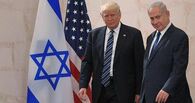
Israel's Prime Minister Benjamin Netanyahu on Sunday announced that a site for a new settlement to be named after the US president Donald Trump in the occupied Golan Heights has been chosen.
"I would like to inform you that we have already selected a site in the Golan Heights where this new community will be established, and we have started the process," Netanyahu said via Twitter.
In April Netanyahu revealed his intention to name a new settlement in Golan after Trump to thank him for recognizing Israel's claim of sovereignty over the Syrian heights.
In March, at the White House, in the presence of Netanyahu, Trump signed a decree under which he recognized Israel's sovereignty over the Syrian territory, a move that sparked widespread international condemnation.
Israel occupied two thirds of Golan Heights during the 1967 war and announced its annexation in 1981, which was rejected by the international community and the United Nations Security Council through Resolution 497.
In an attempt to entrench the annexation move, the Israeli government in April 2018 held its first official meeting in the Syrian Golan since its occupation in 1967.
"I would like to inform you that we have already selected a site in the Golan Heights where this new community will be established, and we have started the process," Netanyahu said via Twitter.
In April Netanyahu revealed his intention to name a new settlement in Golan after Trump to thank him for recognizing Israel's claim of sovereignty over the Syrian heights.
In March, at the White House, in the presence of Netanyahu, Trump signed a decree under which he recognized Israel's sovereignty over the Syrian territory, a move that sparked widespread international condemnation.
Israel occupied two thirds of Golan Heights during the 1967 war and announced its annexation in 1981, which was rejected by the international community and the United Nations Security Council through Resolution 497.
In an attempt to entrench the annexation move, the Israeli government in April 2018 held its first official meeting in the Syrian Golan since its occupation in 1967.
10 may 2019
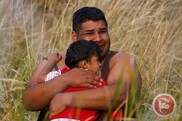
“Lebanon would never survive if half a million Palestinian refugees and 1.6 million Syrian refugees remained in the country,” according to the Lebanese president, Michel Aoun.
Aoun’s remarks came during a meeting held at the presidential palace in Beirut, on Thursday evening, with a delegation from the Middle East Council of Churches (MECC), headed by its Secretary-General, Souraya Bechealany.
Aoun called on the MECC to help the Lebanese government resolve the Syrian refugee issue “by persuading western countries to accept the refugees return to their countries as soon as possible.”
He also pointed out that “Israel has declared that the Palestinian refugees would remain where they are,” and warned that if the refugees remained in Lebanon, “its demographics would change completely.”
The Palestinian Central Bureau of Statistics (PCBS) said in a 2017 report that there are about 174,422 Palestinian refugees that currently live in 12 camps and 156 Palestinian communities across Lebanon’s five districts.
The UN, which runs services in the Palestinian refugee camps in Lebanon, considers them among the most crowded urban areas in the world.
According to the UN High Commissioner for Refugees (UNHCR), the number of Syrian refugees in Lebanon reached a total of 997,000 at the end of November 2017, excluding the Syrians who are not registered with UNHCR.
Aoun’s remarks came during a meeting held at the presidential palace in Beirut, on Thursday evening, with a delegation from the Middle East Council of Churches (MECC), headed by its Secretary-General, Souraya Bechealany.
Aoun called on the MECC to help the Lebanese government resolve the Syrian refugee issue “by persuading western countries to accept the refugees return to their countries as soon as possible.”
He also pointed out that “Israel has declared that the Palestinian refugees would remain where they are,” and warned that if the refugees remained in Lebanon, “its demographics would change completely.”
The Palestinian Central Bureau of Statistics (PCBS) said in a 2017 report that there are about 174,422 Palestinian refugees that currently live in 12 camps and 156 Palestinian communities across Lebanon’s five districts.
The UN, which runs services in the Palestinian refugee camps in Lebanon, considers them among the most crowded urban areas in the world.
According to the UN High Commissioner for Refugees (UNHCR), the number of Syrian refugees in Lebanon reached a total of 997,000 at the end of November 2017, excluding the Syrians who are not registered with UNHCR.
30 apr 2019
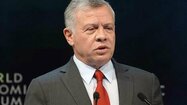
A handout picture released by the Jordanian Royal Palace on April 6, 2019 shows King Abdullah II of Jordan speaking during the opening ceremony of the 2019 World Economic Forum on the Middle East and North Africa, at the King Hussein Convention Center at the Dead Sea, Jordan.
Jordanian King Abdullah II has ordered a review of his country’s multi-billion-dollar deal to import natural gas from the Israeli-occupied territories.
The London-based and Arabic-language Asharq al-Awsat newspaper, citing senior Jordanian political sources, reported that the king made the decision “in a technical report that examines Jordan’s interests from the continuation or the freezing of the agreement.”
Khaled Bakkar, the head of the finance committee in the Jordanian parliament, said the gas deal apart from being “blatant normalization” with the Israeli regime, is “economically weak” based on the feasibility studies.
He stressed that Jordan’s energy production surpassed the country’s needs, and the import of Israeli gas was only for the benefit of the Tel Aviv regime.
On September 26, 2016, Jordan’s National Electric Power Company signed a 10-billion-dollar deal with US-based Noble Energy and Israeli partners, which will tap the Leviathan natural gas field in the Mediterranean Sea off the coast of Israel for the supply of approximately 1.6 trillion cubic feet of natural gas, or 300 million cubic feet per day (mcf/d), over a 15-year term. Production is expected to begin around 2019 or 2020.
On March 26, members of Jordan’s parliament called for the cancellation of the gas deal with Israel during a parliamentary session closed to the public.
House Speaker Atef Tarawneh stated that all sectors of the society and members of parliament utterly reject Jordanian electricity company agreement to buy Israeli natural gas.
Several legislators argued that the multi-billion-dollar deal violates Article 33, section two of the Jordanian constitution, which states: “Treaties and agreements which entail any expenditures to the Treasury of the State or affect the public or private rights of Jordanians shall not be valid unless approved by the parliament; and in no case shall the secret terms in a treaty or agreement be contrary to the overt terms.”
Lawmaker Saddah al-Habashneh said the deal was unconstitutional, stressing that members of parliament were not given access to read what he called the “secret” deal.
“Why are they hiding it? It’s a clue that there is something. It is totally rejected,” he commented.
Habashneh then demanded the deal be scrapped along with Jordan’s peace accord with Israel – known as Wadi Araba Treaty and signed on October 26, 1994.
“We are calling for the Wadi Araba agreement to be dropped. What is peace when they’re attacking Gaza?” the parliamentarian said.
“And with yesterday’s recognition of the Golan Heights, what’s left? We want dignity,” he pointed out.
On March 25, US President Donald Trump signed a proclamation, formally recognizing Israel's sovereignty over the Golan Heights. The announcement came as Israeli Prime Minister Benjamin Netanyahu visited the White House.
The Syrian Ministry of Foreign Affairs and Expatriates, in a statement, called the US decision a “blatant attack on the sovereignty and territorial integrity” of Syria.
“The liberation of the Golan by all available means and its return to the Syrian motherland is an inalienable right,” according to the statement carried by Syria’s official news agency SANA, which added, “The decision ... makes the United States the main enemy of the Arabs.”
The Arab League also condemned the move, saying "Trump's recognition does not change the area's status."
Iran, Iraq, Russia and Turkey also condemned the US move.
Israel seized the Golan Heights from Syria after the 1967 Six-Day War and later occupied it in a move that has never been recognized by the international community.
The regime has built dozens of settlements in the area ever since and has used the region to carry out a number of military operations against the Syrian government.
Jordanian King Abdullah II has ordered a review of his country’s multi-billion-dollar deal to import natural gas from the Israeli-occupied territories.
The London-based and Arabic-language Asharq al-Awsat newspaper, citing senior Jordanian political sources, reported that the king made the decision “in a technical report that examines Jordan’s interests from the continuation or the freezing of the agreement.”
Khaled Bakkar, the head of the finance committee in the Jordanian parliament, said the gas deal apart from being “blatant normalization” with the Israeli regime, is “economically weak” based on the feasibility studies.
He stressed that Jordan’s energy production surpassed the country’s needs, and the import of Israeli gas was only for the benefit of the Tel Aviv regime.
On September 26, 2016, Jordan’s National Electric Power Company signed a 10-billion-dollar deal with US-based Noble Energy and Israeli partners, which will tap the Leviathan natural gas field in the Mediterranean Sea off the coast of Israel for the supply of approximately 1.6 trillion cubic feet of natural gas, or 300 million cubic feet per day (mcf/d), over a 15-year term. Production is expected to begin around 2019 or 2020.
On March 26, members of Jordan’s parliament called for the cancellation of the gas deal with Israel during a parliamentary session closed to the public.
House Speaker Atef Tarawneh stated that all sectors of the society and members of parliament utterly reject Jordanian electricity company agreement to buy Israeli natural gas.
Several legislators argued that the multi-billion-dollar deal violates Article 33, section two of the Jordanian constitution, which states: “Treaties and agreements which entail any expenditures to the Treasury of the State or affect the public or private rights of Jordanians shall not be valid unless approved by the parliament; and in no case shall the secret terms in a treaty or agreement be contrary to the overt terms.”
Lawmaker Saddah al-Habashneh said the deal was unconstitutional, stressing that members of parliament were not given access to read what he called the “secret” deal.
“Why are they hiding it? It’s a clue that there is something. It is totally rejected,” he commented.
Habashneh then demanded the deal be scrapped along with Jordan’s peace accord with Israel – known as Wadi Araba Treaty and signed on October 26, 1994.
“We are calling for the Wadi Araba agreement to be dropped. What is peace when they’re attacking Gaza?” the parliamentarian said.
“And with yesterday’s recognition of the Golan Heights, what’s left? We want dignity,” he pointed out.
On March 25, US President Donald Trump signed a proclamation, formally recognizing Israel's sovereignty over the Golan Heights. The announcement came as Israeli Prime Minister Benjamin Netanyahu visited the White House.
The Syrian Ministry of Foreign Affairs and Expatriates, in a statement, called the US decision a “blatant attack on the sovereignty and territorial integrity” of Syria.
“The liberation of the Golan by all available means and its return to the Syrian motherland is an inalienable right,” according to the statement carried by Syria’s official news agency SANA, which added, “The decision ... makes the United States the main enemy of the Arabs.”
The Arab League also condemned the move, saying "Trump's recognition does not change the area's status."
Iran, Iraq, Russia and Turkey also condemned the US move.
Israel seized the Golan Heights from Syria after the 1967 Six-Day War and later occupied it in a move that has never been recognized by the international community.
The regime has built dozens of settlements in the area ever since and has used the region to carry out a number of military operations against the Syrian government.
23 apr 2019
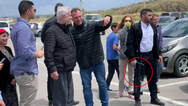
Security guard carrying anti-drone rifle
Vacationing with his family during Passover, PM announces intention to name a town in the strategic plateau after a president much-appreciated in Israel
Prime Minister Benjamin Netanyahu announced Monday that he intends to name a town in the Golan Heights after US President Donald Trump.
"A few weeks ago, I attained the official recognition by President Trump recognizing Israeli sovereignty over the Golan Heights for all eternity," Netanyahu said during a family trip to the northern region. "There is a need to express our gratitude by naming a town or settlement in the Golan Heights after Donald Trump; I will bring it for government approval in the near future."
Last month, Netanyahu visited Trump at the White House where the president signed a declaration recognizing Israeli sovereignty over the strategic plateau Israel captured from Syria during the 1967 Six Day War.
The prime minster was on vacation with his wife Sara and children Yair and Avner in the Golan region. They visited Nahal Sa'ar and Nimrod Fortress, rode jeeps and visited Mt. Hermon as well.
While covering the prime minister's trip, reporters noticed that his security detail has been outfitted with anti-drone rifles.
The device uses radio waves to disrupt the drone's remote-controlled radio communication, causing the drone to drop to the ground or leave the area.
The device appears to be manufactured by the Chinese company HIKVISION which sells its product to law enforcement agencies throughout the world.
Its technical specifications indicate that it can operate along a wide range of frequencies, has a range of one kilometer, a 9X zoom telescope and rechargeable, durable lithium batteries.
In 2017, a State Comptroller report warned about the threat posed by flying drones toward security sensitive sites and individuals and that a solution should be implemented.
The Netanyahu family arrived in the North on Monday and visited an ancient synagogue in Kfar Nahum (Capernaum) and the Gamal Reserves. At night they stayed at a hotel in Tiberias.
While hiking along Nahal Sa'ar, they met dozens of Israeli families enjoying their Passover vacation and many cried out in joy at the sight of the prime minister. Some sang "Bibi, king of Israel."
Vacationing with his family during Passover, PM announces intention to name a town in the strategic plateau after a president much-appreciated in Israel
Prime Minister Benjamin Netanyahu announced Monday that he intends to name a town in the Golan Heights after US President Donald Trump.
"A few weeks ago, I attained the official recognition by President Trump recognizing Israeli sovereignty over the Golan Heights for all eternity," Netanyahu said during a family trip to the northern region. "There is a need to express our gratitude by naming a town or settlement in the Golan Heights after Donald Trump; I will bring it for government approval in the near future."
Last month, Netanyahu visited Trump at the White House where the president signed a declaration recognizing Israeli sovereignty over the strategic plateau Israel captured from Syria during the 1967 Six Day War.
The prime minster was on vacation with his wife Sara and children Yair and Avner in the Golan region. They visited Nahal Sa'ar and Nimrod Fortress, rode jeeps and visited Mt. Hermon as well.
While covering the prime minister's trip, reporters noticed that his security detail has been outfitted with anti-drone rifles.
The device uses radio waves to disrupt the drone's remote-controlled radio communication, causing the drone to drop to the ground or leave the area.
The device appears to be manufactured by the Chinese company HIKVISION which sells its product to law enforcement agencies throughout the world.
Its technical specifications indicate that it can operate along a wide range of frequencies, has a range of one kilometer, a 9X zoom telescope and rechargeable, durable lithium batteries.
In 2017, a State Comptroller report warned about the threat posed by flying drones toward security sensitive sites and individuals and that a solution should be implemented.
The Netanyahu family arrived in the North on Monday and visited an ancient synagogue in Kfar Nahum (Capernaum) and the Gamal Reserves. At night they stayed at a hotel in Tiberias.
While hiking along Nahal Sa'ar, they met dozens of Israeli families enjoying their Passover vacation and many cried out in joy at the sight of the prime minister. Some sang "Bibi, king of Israel."
